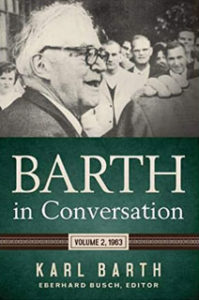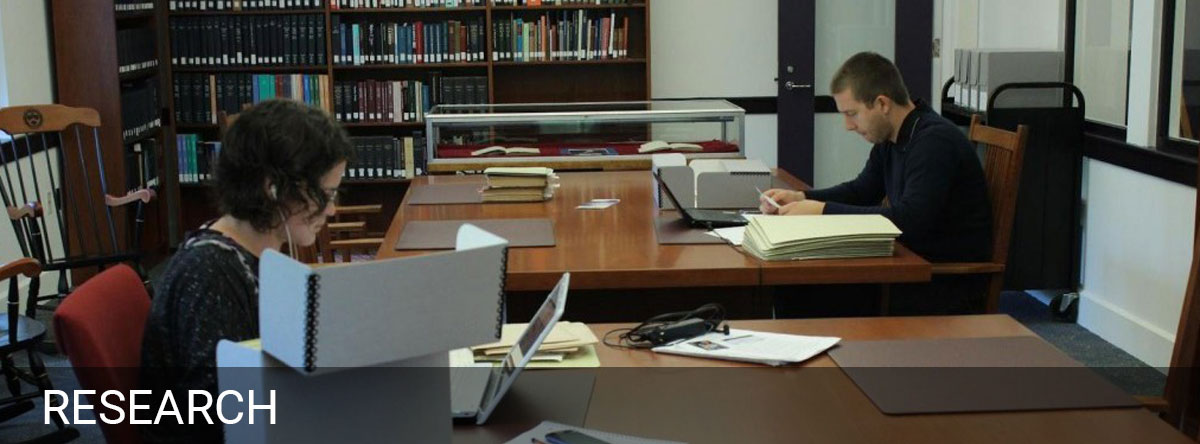
Karl Barth. Barth in Conversation: Volume 2: 1963, Eberhard Busch, ed. (Louisville, KY: Westminster John Knox Press, 2018), xx + 250 pp. $40 (hardback).
Reviewed by Christophe Chalamet (December 15, 2020)
Barth in Conversation: Volume 2 offers some of the interviews and conversations Barth hosted either in his home in Basel, in a neighboring restaurant or elsewhere, in the year 1963, one year after his official retirement from his position at the University of Basel at the age of 76. Not all of the discussions Barth had in that year were recorded or transcribed, and so this volume includes only some of them. But what is included is very interesting and a most welcome addition to the body of Barth’s writings.
These texts were available since 2005 in German as vol. 41 of the Gesamtausgabe (Barth’s complete works), edited by Eberhard Busch (Gespräche 1963, Zurich: TVZ). Conversations from the years 1959-1962 have already been published, both in German (Eberhard Busch ed., Zurich: TVZ, 1995) and in English (Louisville: Westminster John Knox Press, 2017). The conversations from the years 1964-1968, which are published in the third volume of Gespräche, were published in German in 1997 (Eberhard Busch ed., Zurich: TVZ). An English translation was published last year (Louisville: Westminster John Knox Press, 2019).
What kind of conversations do we find in this volume? The first thing to say is that they are varied. Some are conducted by journalists, for national or international newspapers or magazines (the most famous being Time). These journalists asked about the complicated process that led to the naming of a successor to Barth in Basel (Helmut Gollwitzer was a strong contender, favored by many, including Barth himself, but a public outcry over his left-leaning politics derailed the process), or about his views on Pope John XXIII, Paul VI and the council, or on theology and journalism (see e.g. 6-7). Some are discussions with pastors, for instance from France or Germany. Other encounters involved theology students. A brief exchange with students from the Bossey Ecumenical Institute contains snippets, almost in haiku style, that convey some of the essential things Barth wished to say in his writings (8-9). In other discussions with students, Barth was invited to comment on recent developments within Protestant theology (Herbert Braun, Ernst Käsemann, Heinrich Vogel, Jean-Louis Leuba, but also John A. T. Robinson and his highly successful book Honest to God; see 80-81, 91, 111, 161-165, 202). Speaking to the “wave” of Robinson’s pamphlet and the support it had found from Bultmann and Tillich (the latter also invoking Bonhoeffer), Barth was under the impression “that it is turning people off a bit because it is also too boring, it is too thin” (191). That particular conversation then turned quite tense (or “a little vibrant,” as a participant put it; 199), as Barth spoke of pastors and theologians who had become “infected” by Bultmann’s ideas (192), and the tension only rose further as a participant told Barth that to them he was “a part of history” (200).
In several conversations, Barth expresses his astonishment and joy at having heard Pope Paul VI unambiguously emphasize the centrality of Jesus Christ in his opening address (on September 29, 1963) to the second session of the council (90, 145, 206, 225). Certainly, this was a balm for Barth, who was distressed by the success of Robinson’s book and by the kind of praise it had received by some of his old theologian friends and conversation partners. Discussing Heinrich Vogel, Barth makes very interesting comments on the use and abuse of “paradox” in theology. Certainly, “the theology free from contradiction […] is an eschatological concept,” and yet theology cannot “content” itself “with paradoxes,” it must not be “stuck” in paradoxes: the most important thing is in fact to keep everything “in motion” (93).
In one of the discussions, Barth expresses his critique of Billy Graham’s evangelistic strategy: “he goes after people with gun in hand and says, ‘You must be born anew!’” (96). To theology students at the Protestant faculty in Paris, Barth, who was puzzled by their questions (“where can we see Jesus Christ?”; “Should the Church stop speaking and choose silence?”), says: “The questions I’m hearing here are funny. You are all so complicated, and I am the one who is simple. You are young, but it seems to me as though you’re talking a little like old folks” (110).
One of the interviews Barth gave, in Copenhagen in April 1963, was (wonderfully) titled: “It is not my fault that there are Barthians” (11)! In another interview given in that city, he concludes by saying: “I have never demanded that someone should parrot me. It is not about me, but about the truth, the truth in love” (19). As is well-known, the truth, for Barth, is personified or incarnated in the figure of Jesus of Nazareth, the Christ. This leads Barth to worry a little bit about “Christology,” which as a doctrinal construct may become a sort of screen that blocks the one who really matters, namely Christ himself (90).
The interview with Georges Casalis from May 12, 1963 is noteworthy, especially when Barth describes his Church Dogmatics (CD) as a way of circling the same mountain, again and again, looking at it from various perspectives (24). The original, German editorial introduction to this conversation states that the tape recording of this interview could not be found (20), but in fact it circulated here and there, not just as an audiotape but as a video.
There are some recurring topics or concerns in these lectures. One of them is Barth’s critique of Gerhard Ebeling’s theology of “faith” (60-61, 166, 202-204), which he sees as a severe reduction, similar to Luther’s early theology, or Ernst Fuchs’s “glossolalia” (202). Barth was not thrilled to see the creation, under the leadership of Ebeling, of an “Institute of Hermeneutics” at the University of Zurich (196, 200). Infant baptism is another recurring topic (57-65).
One sees in these exchanges a Barth who is happy to interact with Pietist pastors of various stripes (see the very long and rich conversation with the Württemberg Church Brotherhood, 28-69, and his mention of various Pietist groups who came to meet him; 69 and 177). The battles of the early years (around the end of World War I and in the ensuing years) were long gone, and Barth wishes to send signals of humility in the course of the discussion. As he puts it at the close of their long conversation: “All of this was not [presented] dogmatikōs [as a firm doctrinal formulation] but gymnastikōs [as something to be tested]. If this or that turned out to be helpful to you, then I am certainly glad about that” (69). In a particularly interesting moment from a conversation with pastors from the Rhineland, Barth explains how students who attend his seminar discussions (Sozietäten) in Basel at times arrive with a certain inner distance, thinking: “Aha, this is that monument worthy of historic preservation, which one must respect but of course cannot follow.” But some of these students eventually realize, after several meetings and a close reading of a brief excerpt (30 pages or so) from the Church Dogmatics, that “everything is completely different” from what they imagined (191). Barth repeats this in several conversations, and at one point in the one conversation where things became tense, he wished he could simply read a small section of CD with his guests to try to alleviate the criticisms that are addressed to him. At the same time, Barth made sure to say that he had a “tough skin” and that he was ready to hear all of the critiques, even those that are expressed bluntly.
The translation seems to be excellent throughout. I have spotted only a few infelicities, for instance, the mention of the death of an esteemed colleague and friend, Hans-Joachim Iwandt, who has been “immortalized” (90; such a literal translation of the German “verewigt” does not seem ideal to me; see Gespräche 1963, 137). There are also a few errors. On 111n6: “et” instead of “und”; on 122n22 and 188n104, the French contains several minor errors; on 202n139: “May 28, 1912” instead of “May 28, 1922.” But these details should not detract from the clear, significant gain that this publication represents, and from the gratitude for the hard work that was needed to bring this project to completion.
I would like to end this review with this reminder, with which Barth closes his conversation with students from Göttingen: the old, esteemed professor wishes them “a successful conclusion of [their] theological studies, the completion of which is actually to be expected only at the conclusion of [their] earthly days” (104).
Christophe Chalamet, Associate Professor of Systematic Theology, University of Geneva
The views expressed here are strictly those of the author; they do not necessarily represent the views of the Center for Barth Studies or Princeton Theological Seminary.

